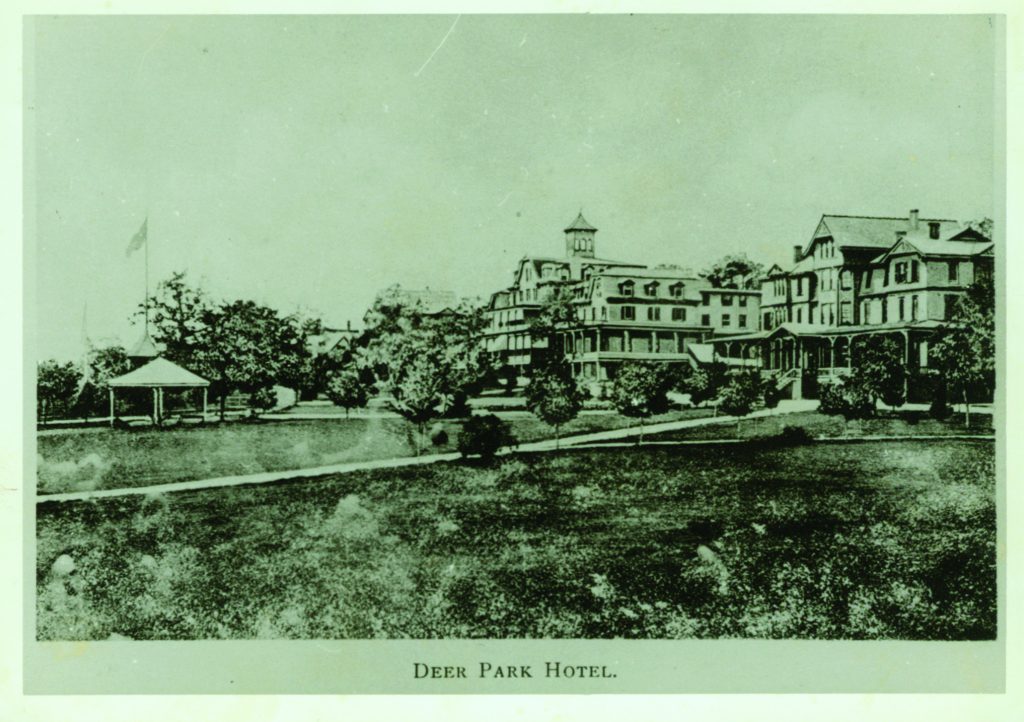Garrett County’s cool summers, crisp mountain air and breathtaking scenery have lured visitors to the area for over 150 years. Long before Deep Creek Lake or Wisp Resort were even a thought, the Baltimore and Ohio Railroad transported wealthy summer patrons out of the city heat to the grand hotels and elaborate summer cottages of Oakland, Deer Park, Loch Lynn and Mountain Lake Park.
Deer Park
During the post Civil War period, the B&O Railroad increased its passenger traffic by capitalizing on cool Garrett County summers. In the days before air conditioning, it became quite fashionable escape to the mountains from the oppressive urban heat. This expansion spawned a chain of posh hotels along the route west. B&O built two new resort retreats on the mountain top during the 1870’s. The first to be completed was the Deer Park Hotel, which opened for business on July 4th, 1873. Featuring a golf course, a building for billiards and bowling, private rental cottages and a large glass-covered bath house containing two swimming pools as well as Turkish and Russian baths, it was quite a spectacle in rural Garrett County. The Deer Park attracted many famous visitors over the years including General Ulysses S. Grant and President Grover Cleveland, who honeymooned at the resort.

The overwhelming success of the Deer Park inspired the construction of another hotel just a few years later. Located along the tracks and across from the train Oakland train station, the Oakland Hotel featured a large ballroom, accommodations for over a hundred guests, and a large park of maple, oak and pine. In 1883, Alexander Graham Bell took a “working vacation” at the Oakland hotel and oversaw the installation of Garrett County’s first telephone service. A line connected the Oakland and Deer Park resorts which were about five miles apart.
Mountain Lake Park
Around this same time a group of businessmen and Methodist ministers from Wheeling, WVA founded the town of Mountain Lake Park. Their goal was to create a Chautauqua resort based strictly on Christian principles. A chautauqua is an educational and recreational assembly with programs that include lectures and concerts modeled after the original summer schools inaugurated at Chautauqua, New York in 1874. Most Chautauquas were established to promote Christian principles and were seen as a place to refresh both mind and body. The group chose the site known as Hoye’s big pasture, eight hundred acres of picturesque scenery conveniently located to train service. The town was optimistically named Mountain Lake Park, despite the lack of an actual lake. Situated between Oakland and Deer Park, the area quickly sprang to life. Homes and businesses, a lake (to justify the name), and other attractions were soon developed. It is a perfect example of a Victorian Resort that grew out of two popular American activities in the nineteenth century – the Independent Chautauqua and the Methodist Camp Meeting. Principles were promoted and covenants were established for those living and visiting here which prohibited gambling, card playing, dancing, and the use or sale of alcohol. The new community also included a photography school, philosophy hall, a school of domestic science and the Bashford amphitheater that could seat over five thousand people. Popular speakers that appeared at the amphitheater include: President William Howard Taft, famed evangelist Rev. Billy Sunday and noted orator and presidential candidate William Jennings Bryan.
Traveling by horse or by train, many of the visitors purchased land and built elaborate “cottages.” Publications from that time stress that the vacation homes were “cottages, not cabins.” Cabins they were not, but neither do they fit the modern definition of “cottage.” Typically, cottages were three stories with roofs garnished with turrets that were so large they could accommodate extended family.
When arriving at the Mountain Lake Park Train Station, visitors could catch a glimpse of the Loch Lynn Hotel where, dancing, gambling, and drinking of alcoholic beverages took place. Local lore suggests that one of the members of the group that founded Mountain Lake quietly defected and initiated development just a few miles down the tracks. The town of Loch Lynn was Garrett County’s own “sin city.” A saying developed that went: “If you want to sin, go to Loch Lynn; but for Jesus sake, come to Mountain Lake.” Many early advertisements made the most of the obvious contrasts between the two communities.
In Conclusion
While the extravagant hotels of the late 19th century are no longer standing, many of the cottages have been restored to their original glory and have been named to the National Historic Registry. Enjoy picturesque self-guided walking tours through the historic district and view the Victorian architecture throughout the year. Audio tape tours and other information is available by contacting the Mountain Lake Park Town Hall at 301-334-2250.





